
Artistic Perception, A to Z


Yaacov Agam
Near the Wall of a House
Near the wall of a house painted
to look like stone,
I saw visions of God.
A sleepless night that gives others a headache
gave me flowers
opening beautifully inside my brain.
And he who was lost like a dog
will be found like a human being
and brought back home again.
Love is not the last room: there are others
after it, the whole length of the corridor
that has no end.
Yehuda Amichai
from Selected Poetry of Yehuda Amichai.
Edited and translated by Chana Bloch and Stephen Mitchell (1986).
HarperCollins Publishers, Inc., New York, NY
Copyright 1986 by Yehuda Amichai.
All rights reserved.
I Know Why the Caged Bird Sings excerpt
Wouldn't they be surprised when one day I woke out of my black ugly dream, and my real hair, which was long and blond, would take the place of the kinky mass that Momma wouldn't let me straighten? My light-blue eyes were going to hypnotize them, after all the things they said about "my daddy must of been a Chinaman" (I thought they meant made out of china, like a cup) because my eyes were so small and squinty. Then they would understand why I had never picked up a Southern accent, or spoke the common slang, and why I had to be forced to eat pigs' tails and snouts. Because I was really white and because a cruel fairy stepmother, who was understandably jealous of my beauty, had turned me into a too-big Negro girl, with nappy black hair, broad feet and a space between her teeth that would hold a number-two pencil.
"What you looking ..." The minister's wife leaned toward me, her long yellow face full of sorry. She whispered, "I just come to tell you, it's Easter Day." I repeated, jamming the words together, "Ijustcometotellyouit'sEasterDay," as low as possible. The giggles hung in the air like melting clouds that were waiting to rain on me. I held up two fingers, close to my chest, which meant that I had to go to the toilet, and tiptoed toward the rear of the church. Dimly, somewhere over my head, I heard ladies saying, "Lord bless the child," and "Praise God." My head was up and my eyes were open, but I didn't see anything. Halfway down the aisle, the church exploded with "Were you there when they crucified my Lord?" and I tripped over a foot stuck out from the children's pew. I stumbled and started to say something, or maybe to scream, but a green persimmon, or it could have been a lemon, caught me between the legs and squeezed. I tasted the sour on my tongue and felt it in the back of my mouth. Then before I reached the door, the sting was burning down my legs and into my Sunday socks. I tried to hold, to squeeze it back, to keep it from speeding, but when I reached the church porch I knew I'd have to let it go, or it would probably run right back up to my head and my poor head would burst like a dropped watermelon, and all the brains and spit and tongue and eyes would roll all over the place. So I ran down into the yard and let it go. I ran, peeing and crying, not toward the toilet out back but to our house. I'd get a whipping for it, to be sure, and the nasty children would have something new to tease me about. I laughed anyway, partially for the sweet release; still, the greater joy came not only from being liberated from the silly church but from the knowledge that I wouldn't die from a busted head.
If growing up is painful for the Southern Black girl, being aware of her displacement is the rust on the razor that threatens the throat.
It is an unnecessary insult.
May Angelou

Apple computer

Diane Arbus
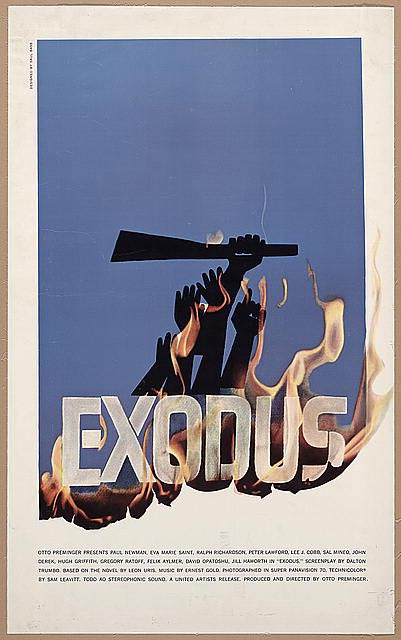
Saul Bass
|
The Fish I caught a tremendous fish |
— It was more like the tipping And I let the fish go. Elizabeth Bishop |

Giambattista Bodoni
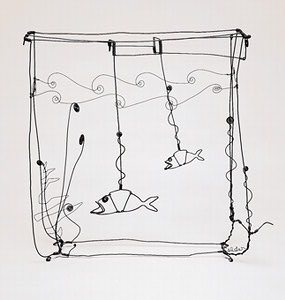
Alexander Calder
A Christmas Memory excerpt
Imagine a morning in late November. A coming of winter morning more than twenty years ago. Consider the kitchen of a spreading old house in a country town. A great black stove is its main feature; but there is also a big round table and a fireplace with two rocking chairs placed in front of it. Just today the fireplace commenced its seasonal roar.
A woman with shorn white hair is standing at the kitchen window. She is wearing tennis shoes and a shapeless gray sweater over a summery calico dress. She is small and sprightly, like a bantam hen; but, due to a long youthful illness, her shoulders are pitifully hunched. Her face is remarkable -- not unlike
The person to whom she is speaking is myself. I am seven; she is sixty-something. We are cousins, very distant ones, and we have lived together --- well, as long as I can remember. Other people inhabit the house, relatives, and though they have power over us, and frequently make us cry, we are not, on the whole, too much aware of them. We are each other's best friend. She calls me Buddy, in memory of a boy who was formerly her best friend. The other Buddy died in the 1880s, when she was still a child. She is still a child.
Truman Capote
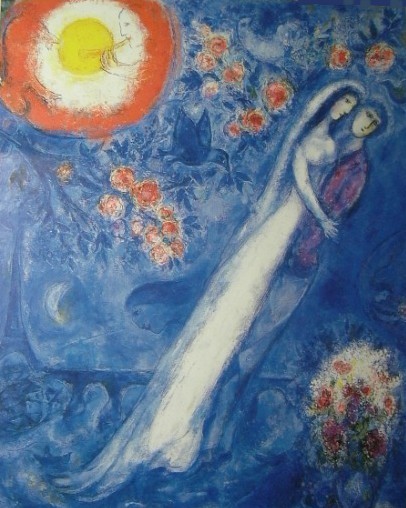
Marc Chagall
The
The General Prologue excerpt
Whan that Aprill with his showres soote
the droughte of March hath perced to the roote,
And bathed every veine in swich licour,
Of which vertu engendred is the flowr;
Whan Zephyrus eek with his sweete breeth
Inspired hath in every holt and heeth
The tendre croppes, and the yonge sonne
Hath in the Ram his halve cours yronne,
And smale fowles maken melodye
That sleepen al the night with open yë-
So priketh hem Nature in hir corages-
Thanne longen folk to goon on pilgrimages,
And palmeres for to seeken straunge strondes
To ferne halwes, couthe in sondry londes;
And specially from every shires ende
Of Engelonde to Canterbury they wende,
The holy blisful martyr for to seeke
That hem hath holpen whan that they were seke.
Geoffrey Chaucer
The House on Mango Street excerpt
My Name
In English my name means hope. In Spanish it means too many letters. It means sadness, it means waiting. It is like the number nine. A muddy color. It is the Mexican records my father plays on Sunday mornings when he is shaving, songs like sobbing.
It was my great-grandmother's name and now it is mine. She was a horse woman too, born like me in the Chinese year of the horse--which is supposed to be bad luck if you're born female-but I think this is a Chinese lie because the Chinese, like the Mexicans, don't like their women strong.
My great-grandmother. I would've liked to have known her, a wild, horse of a woman, so wild she wouldn't marry. Until my great-grandfather threw a sack over her head and carried her off. Just like that, as if she were a fancy chandelier. That's the way he did it.
And the story goes she never forgave him. She looked out the window her whole life, the way so many women sit their sadness on an elbow. I wonder if she made the best with what she got or was she sorry because she couldn't be all the things she wanted to be. Esperanza. I have inherited her name, but I don't want to inherit her place by the window.
At school they say my name funny as if the syllables were made out of tin and hurt the roof of your mouth. But in Spanish my name is made out of a softer something, like silver, not quite as thick as sister's name
Sandra Cisneros
Questions About Angels
Of all the questions you might want to ask
about angels, the only one you ever hear
is how many can dance on the head of a pin.
No curiosity about how they pass the eternal time
besides circling the Throne chanting in Latin
or delivering a crust of bread to a hermit on earth
or guiding a boy and girl across a rickety wooden bridge.
Do they fly through God's body and come out singing?
Do they swing like children from the hinges
of the spirit world saying their names backwards and forwards?
Do they sit alone in little gardens changing colors?
What about their sleeping habits, the fabric of their robes,
their diet of unfiltered divine light?
What goes on inside their luminous heads? Is there a wall
these tall presences can look over and see hell?
If an angel fell off a cloud, would he leave a hole
in a river and would the hole float along endlessly
filled with the silent letters of every angelic word?
If an angel delivered the mail, would he arrive
in a blinding rush of wings or would he just assume
the appearance of the regular mailman and
whistle up the driveway reading the postcards?
No, the medieval theologians control the court.
The only question you ever hear is about
the little dance floor on the head of a pin
where halos are meant to converge and drift invisibly.
It is designed to make us think in millions,
billions, to make us run out of numbers and collapse
into infinity, but perhaps the answer is simply one:
one female angel dancing alone in her stocking feet,
a small jazz combo working in the background.
She sways like a branch in the wind, her beautiful
eyes closed, and the tall thin bassist leans over
to glance at his watch because she has been dancing
forever, and now it is very late, even for musicians.
Billy Collins
somewhere i have never traveled ,gladly beyond
somewhere i have never traveled, gladly beyond
any experience, your eyes have their silence:
in your most frail gesture are things which enclose me,
or which i cannot touch because they are too near
your slightest look will easily unclose me
though i have closed myself as fingers,
you open always petal by petal myself as Spring opens
(touching skillfully, mysteriously)her first rose
or if your wish be to close me, i and
my life will shut very beautifully ,suddenly,
as when the heart of this flower imagines
the snow carefully everywhere descending;
nothing which we are to perceive in this world equals
the power of your intense fragility: whose texture
compels me with the color of its countries,
rendering death and forever with each breathing
(i do not know what it is about you that closes
and opens; only something in me understands
the voice of your eyes is deeper than all roses)
nobody, not even the rain, has such small hands
e. e. cummings
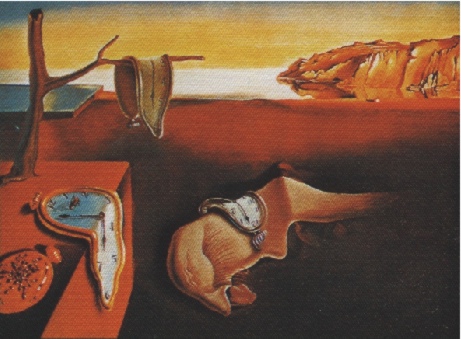

Marcel Duchamp

Charles and Ray Eames
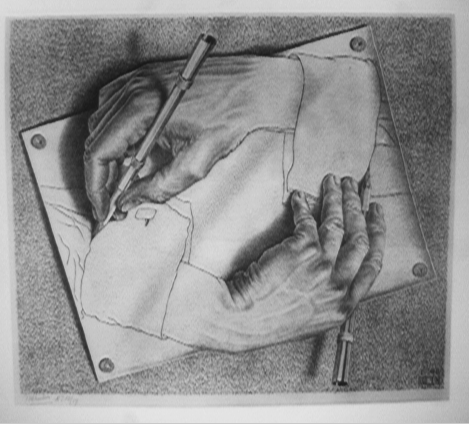
M C Escher
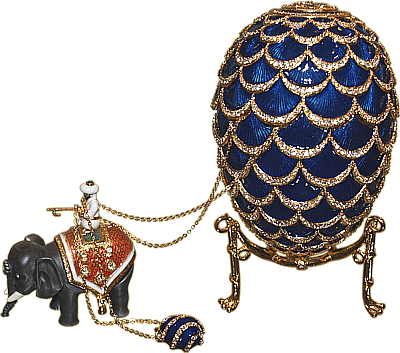
Peter Carl Faberge
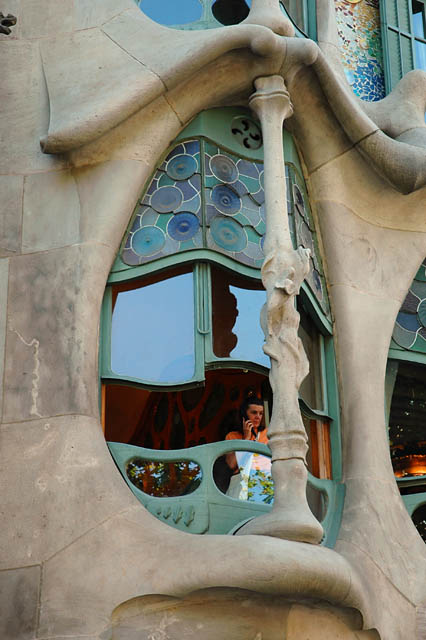
Antonio Gaudi

Milton Glaser
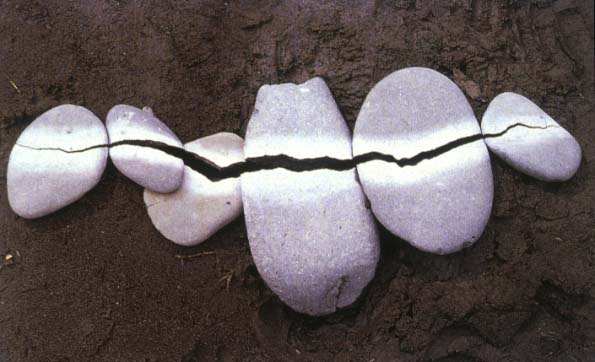
Andy Goldsworthy

Zaha Hadid
Siddhartha
Chapter 11 excerpt
… Let's listen, you'll hear more.
They listened. Softly sounded the river, singing in many voices. Siddhartha looked into the water, and images appeared to him in the moving water: his father appeared, lonely, mourning for his son; he himself appeared, lonely, he also being tied with the bondage of yearning to his distant son; his son appeared, lonely as well, the boy, greedily rushing along the burning course of his young wishes, each one heading for his goal, each one obsessed by the goal, each one suffering. The river sang with a voice of suffering, longingly it sang, longingly, it flowed towards its goal, lamentingly its voice sang.
“Do you hear?” Vasudeva's mute gaze asked. Siddhartha nodded.
“Listen better!” Vasudeva whispered.
Siddhartha made an effort to listen better. The image of his father, his own image, the image of his son merged, Kamala's image also appeared and was dispersed, and the image of Govinda, and other images, and they merged with each other, turned all into the river, headed all, being the river, for the goal, longing, desiring, suffering, and the river's voice sounded full of yearning, full of burning woe, full of unsatisfiable desire. For the goal, the river was heading, Siddhartha saw it hurrying, the river, which consisted of him and his loved ones and of all people, he had ever seen, all of these waves and waters were hurrying, suffering, towards goals, many goals, the waterfall, the lake, the rapids, the sea, and all goals were reached, and every goal was followed by a new one, and the water turned into vapour and rose to the sky, turned into rain and poured down from the sky, turned into a source, a stream, a river, headed forward once again, flowed on once again. But the longing voice had changed. It still resounded, full of suffering, searching, but other voices joined it, voices of joy and of suffering, good and bad voices, laughing and sad ones, a hundred voices, a thousand voices.
Hermann Hesse
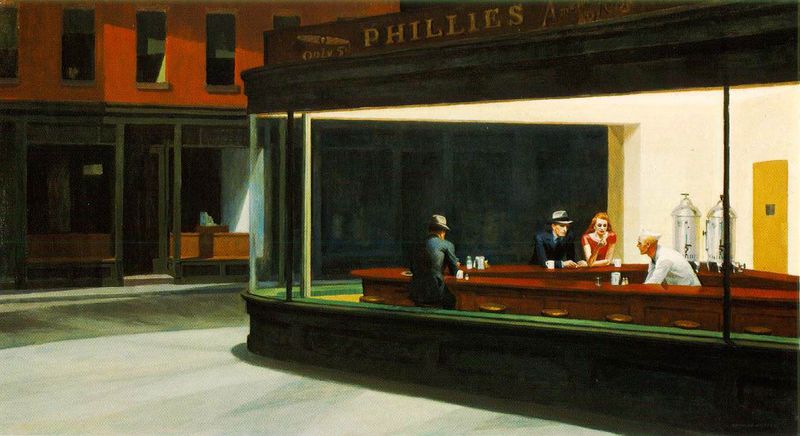
Edward Hooper
Pied Beauty
GLORY be to God for dappled things—
For skies of couple-colour as a brinded cow;
For rose-moles all in stipple upon trout that swim;
Fresh-firecoal chestnut-falls; finches’ wings;
Landscape plotted and pieced—fold, fallow, and plough;
And all trades, their gear and tackle and trim.
All things counter, original, spare, strange;
Whatever is fickle, freckled (who knows how?)
With swift, slow; sweet, sour; adazzle, dim;
He fathers-forth whose beauty is past change:
Praise him.
Gerard Manley Hopkins

James T. Hubbell and Drew L. Hubbell

Johannes Itten

Alexei Jawlensky

Frida Kahlo

Wassily Kandinsky
On The Road excerpt
'Nobody knows where Slim Gaillard is'
'... one night we suddenly went mad together again; we went to see Slim Gaillard in a little Frisco nightclub. Slim Gaillard is a tall, thin Negro with big sad eyes who's always saying 'Right-orooni' and 'How 'bout a little bourbon-arooni.' In Frisco great eager crowds of young semi-intellectuals sat at his feet and listened to him on the piano, guitar and bongo drums. When he gets warmed up he takes off his undershirt and really goes. He does and says anything that comes into his head. He'll sing 'Cement Mixer, Put-ti Put-ti' and suddenly slow down the beat and brood over his bongos with fingertips barely tapping the skin as everybody leans forward breathlessly to hear; you think he'll do this for a minute or so, but he goes right on, for as long as an hour, making an imperceptible little noise with the tips of his fingernails, smaller and smaller all the time till you can't hear it any more and sounds of traffic come in the open door. Then he slowly gets up and takes the mike and says, very slowly, 'Great-orooni ... fine-ovauti ... hello-orooni ... bourbon-orooni ... all-orooni ... how are the boys in the front row making out with their girls-orooni ... orooni ... vauti ... oroonirooni ..." He keeps this up for fifteen minutes, his voice getting softer and softer till you can't hear. His great sad eyes scan the audience.
Dean stands in the back, saying, 'God! Yes!' -- and clasping his hands in prayer and sweating. 'Sal, Slim knows time, he knows time.' Slim sits down at the piano and hits two notes, two C's, then two more, then one, then two, and suddenly the big burly bass-player wakes up from a reverie and realizes Slim is playing 'C-Jam Blues' and he slugs in his big forefinger on the string and the big booming beat begins and everybody starts rocking and Slim looks just as sad as ever, and they blow jazz for half an hour, and then Slim goes mad and grabs the bongos and plays tremendous rapid Cubana beats and yells crazy things in Spanish, in Arabic, in Peruvian dialect, in Egyptian, in every language he knows, and he knows innumerable languages. Finally the set is over; each set takes two hours. Slim Gaillard goes and stands against a post, looking sadly over everybody's head as people come to talk to him. A bourbon is slipped into his hand. 'Bourbon-orooni -- thank-you-ovauti ...' Nobody knows where Slim Gaillard is. Dean once had a dream that he was having a baby and his belly was all bloated up blue as he lay on the grass of a
Literary Kicks
Jack Kerouac

Gustav Klimt
Break
We put the puzzle together piece
by piece, loving how one curved
notch fits so sweetly with another.
A yellow smudge becomes
the brush of a broom, and two blue arms
fill in the last of the sky.
We patch together porch swings and autumn
trees, matching gold to gold. We hold
the eyes of deer in our palms, a pair
of brown shoes. We do this as the child
circles her room, impatient
with her blossoming, tired
of the neat house, the made bed,
the good food. We let her brood
as we shuffle through the pieces,
setting each one into place with a satisfied
tap, our backs turned for a few hours
to a world that is crumbling, a sky
that is falling, the pieces
we are required to return to.
Dorianne Laux
from Awake, 2001
University of Arkansas Press
Copyright 2001 by Dorianne Laux.
All rights reserved.
To Kill a Mockingbird excerpt
When I was almost six and Jem was nearly ten, our summertime boundaries (within calling distance of Calpurnia) were Mrs. Henry Lafayette Dubose's house two doors to the north of us, and the Radley Place three doors to the south. We were never tempted to break them. The
That was the summer Dill came to us.
Early one morning as we were beginning our day's play in the back yard, Jem and I heard something next door in Miss Rachel Haverford's collard patch. We went to the wire fence to see if there was a puppy--Miss Rachel's rat terrier was expecting--instead we found someone sitting looking at us. Sitting down, he wasn't much higher than the collards. We stared at him until he spoke:
"Hey."
"Hey yourself," said Jem pleasantly.
"I'm Charles Baker Harris," he said. "I can read."
"So what?" I said.
"I just thought you'd like to know I can read. You got anything needs readin' I can do it. . . ."
"How old are you," asked Jem, "four-and-a-half?"
"Goin' on seven."
"Shoot no wonder, then," said Jem, jerking his thumb at me. "Scout yonder's been readin' ever since she was born, and she ain't even started to school yet. You look right puny for goin' on seven."
"I'm little but I'm old," he said.
Jem brushed his hair back to get a better look. "Why don't you come over, Charles Baker Harris?" he said. "Lord, what a name."
"'s not any funnier'n yours. Aunt Rachel says your name's Jeremy Atticus Finch."
Jem scowled. "I'm big enough to fit mine," he said. "Your name's longer'n you are. Bet it's a foot longer."
"Folks call me Dill," said Dill, struggling under the fence.
Harper Lee
To Kill a Mockingbird. Copyright © by Harper Lee.

Maya Lin

Raymond Loewy
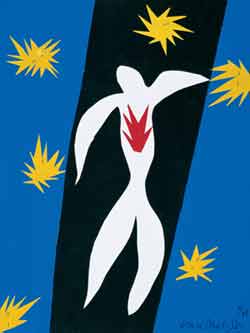
Henri Matisse
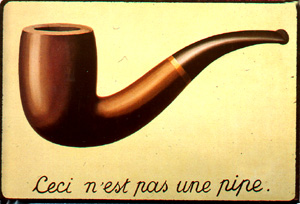
Rene Magritte
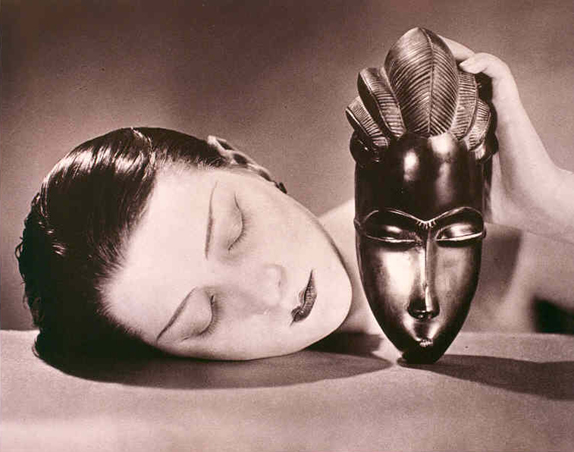
ManRay
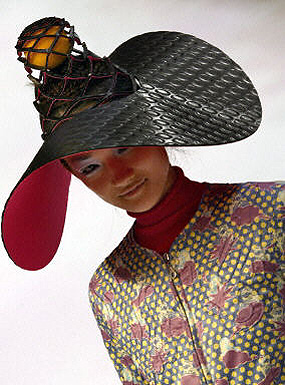
Issey Miyake

Piet Mondrian
| Poema XV
Me gustas cuando callas porque ests como ausente, y me oyes desde lejos, y mi voz no te toca. Parece que los ojos se te hubieran volado y parece que un beso te cerrara la boca. Como todas las cosas estn llenas de mi alma, emerges de las cosas, llena del alma m’a. Mariposa de sue–o, te pareces a mi alma, y te pareces a la palabra melancol’a. Me gustas cuando callas y ests como distante. Y ests como quej‡ndote, mariposa en arrullo. Y me oyes desde lejos, y mi voz no te alcanza: DŽjame que me calle con el silencio tuyo. Djame que te hable tambin con tu silencio claro como una lmpara, simple como un anillo. Eres como la noche, callada y constelada. Tu silencio es de estrella, tan lejano y sencillo. Me gustas cuando callas porque ests como ausente. Distante y dolorosa como si hubieras muerto. Una palabra entonces, una sonrisa bastan. Y estoy alegre, alegre de que no sea cierto. |
Poema XVI
I like it when you're quiet. It's as if you weren't here now,
and you heard me from a distance, and my voice couldn't reach you. It's as if your eyes had flown away from you, and as if your mouth were closed because I leaned to kiss you. Just as all living things are filled with my soul. you emerge from all living things filled with the soul of me. It's as if, a butterfly in dreams, you were my soul, and as if you were the soul's word, melancholy. I like it when you're quiet. It's as if you'd gone away now, And you'd become the keening, the butterfly's insistence, And you heard me from a distance and my voice didn't reach you. It's then that what I want is to be quiet with your silence. It's then that what I want is to speak to you your silence in a speech as clear as lamplight, as plain as a gold ring. You are quiet like the night, and like the night you're star-lit. Your silences are star-like, they're a distant and a simple thing. I like it when you're quiet. It's as if you weren't here now. As if you were dead now, and sorrowful, and distant. A word then is sufficient, or a smile, to make me happy, Happy that it seems so certain that you're present. Translated by Hass Pablo Neruda |

Richard Neutra
The Rider
A boy told me
if he roller-skated fast enough
his loneliness couldn’t catch up to him,
the best reason I ever heard
for trying to be a champion.
What I wonder tonight
pedaling hard down King William Street
is if it translates to bicycles.
A victory! To leave your loneliness
panting behind you on some street corner
while you float free into a cloud of sudden azaleas,
pink petals that have never felt loneliness,
no matter how slowly they fell.
Naomi Shihab Nye
from Fuel: Poems by Naomi Shihab Nye, 1998
Boa Editions, Rochester, NY
Copyright 1998 by Naomi Shihab Nye.
All rights reserved.

Georgia O’Keeffe
Reckless Poem
Today again I am hardly myself.
It happens over and over.
It is heaven-sent.
It flows through me
like the blue wave.
Green leaves – you may believe this or not –
have once or twice
emerged from the tips of my fingers
somewhere
deep in the woods,
in the reckless seizure of spring.
Though, of course, I also know that other song,
the sweet passion of one-ness.
Just yesterday I watched an ant crossing a path, through the
tumbled pine needles she toiled.
And I thought: she will never live another life but this one.
And I thought: if she lives her life with all her strength
is she not wonderful and wise?
And I continued this up the miraculous pyramid of everything
until I came to myself.
And still, even in these northern woods, on these hills of sand,
I have flown from the other window of myself
to become white heron, blue whale,
red fox, hedgehog.
Oh, sometimes already my body has felt like the body of a flower!
Sometimes already my heart is a red parrot, perched
among strange, dark trees, flapping and screaming.
Mary Oliver
From Five Points
Volume 6, No.3 2002
Copyright Mary Oliver.
All rights reserved.

Claes Oldenburg
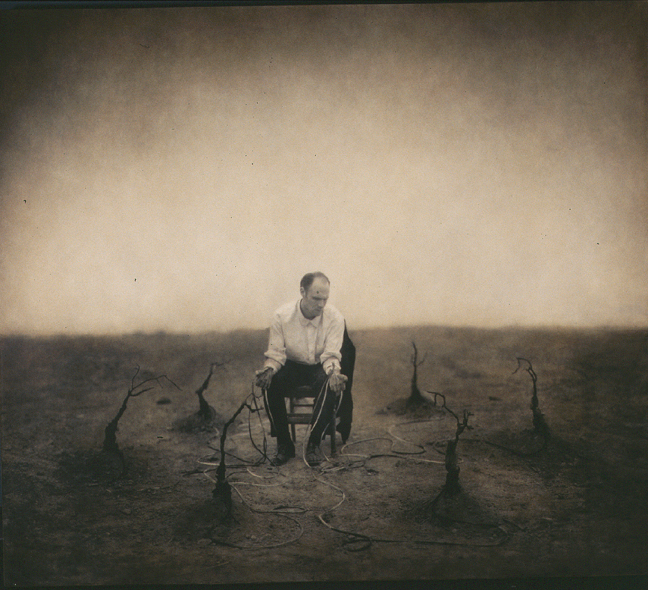
Robert ParkeHarrison
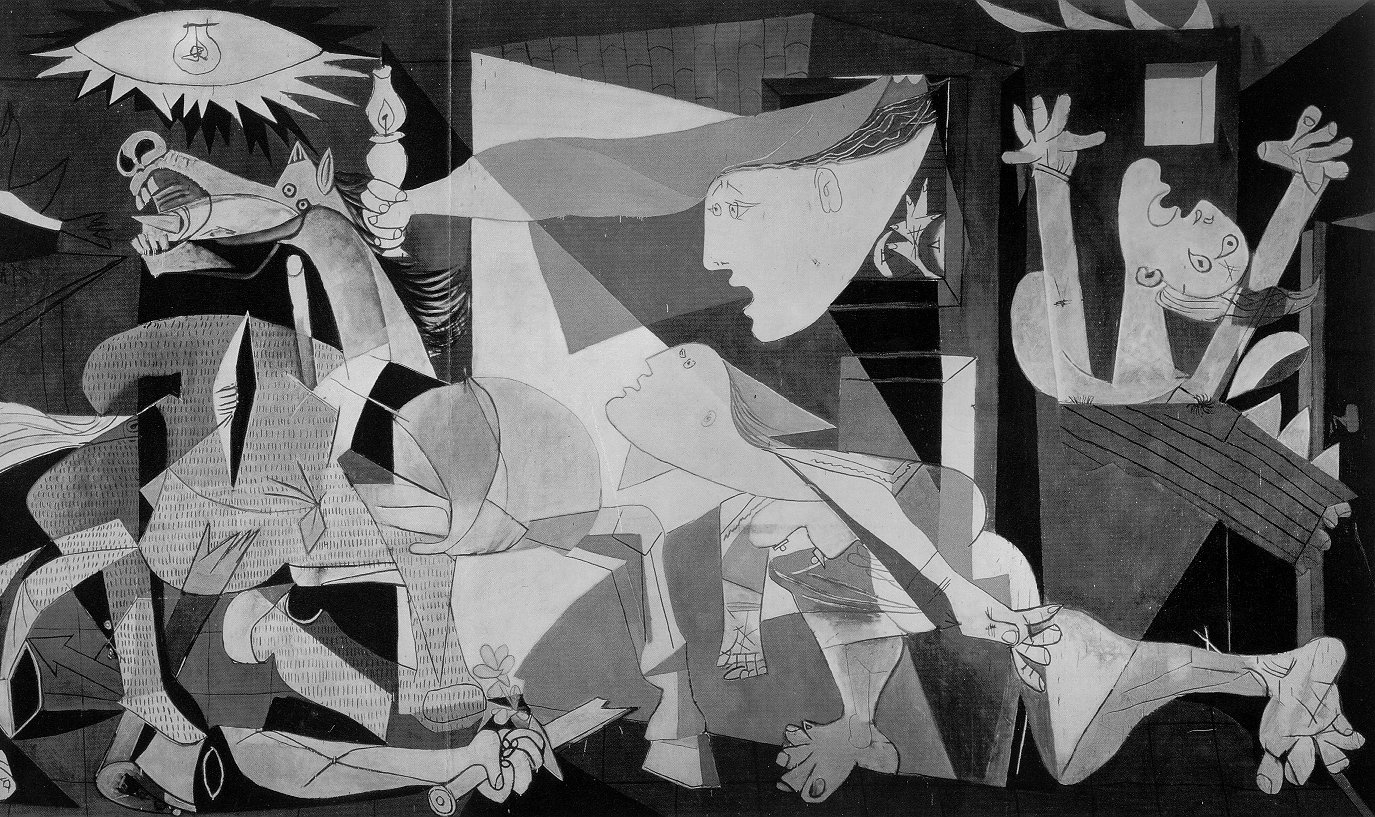
Pablo Picasso
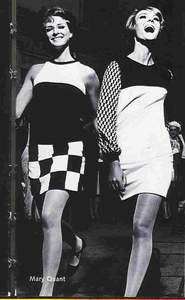
Mary Quant
ANNA QUINDLEN'S COMMENCEMENT SPEECH
MOUNT HOLYOKE COLLEGE
MAY 23, 1999
I look at all of you today and I cannot help but see myself twenty-five years ago, at my own Barnard commencement. I sometimes seem, in my mind, to have as much in common with that girl as I do with any stranger I might pass in the doorway of a Starbucks or in the aisle of an airplane. I cannot remember what she wore or how she felt that day. But I can tell you this about her without question: she was perfect...
And sitting there, you will fall into the center of yourself. You will look for that core to sustain you. If you have been perfect all your life, and have managed to meet all the expectations of your family, your friends, your community, your society, chances are excellent that there will be a black hole where your core ought to be.
Don't take that chance. Begin to say no to the Greek chorus that thinks it knows the parameters of a happy life when all it knows is the homogenization of human experience. Listen to that small voice from inside you, that tells you to go another way. George Eliot wrote, "It is never too late to be what you might have been." It is never too early, either. And it will make all the difference in the world. Take it from someone who has left the backpack full of bricks far behind. Every day feels light as a feather.
Anna Quindlen

Paul Rand

Mark Rothko
Harry Potter and the Sorcerer’s Stone excerpt
Chapter Two: "The Vanishing Glass"
Nearly ten years had passed since the Dursleys had woken up to find their nephew on the front step, but
Yet Harry Potter was still there, asleep at the moment, but not for long. His Aunt Petunia was awake and it was her shrill voice that made the first noise of the day.
"Up! Get up! Now!"
Harry woke with a start. His aunt rapped on the door again.
"Up!" she screeched. Harry heard her walking toward the kitchen and then the sound of the frying pan being put on the stove. He rolled onto his back and tried to remember the dream he had been having. It had been a good one. There had been a flying motorcycle in it. He had a funny feeling he'd had the same dream before.
His aunt was back outside the door.
"Are you up yet?" she demanded.
"Nearly," said Harry.
"Well, get a move on, I want you to look after the bacon. And don't you dare let it burn, I want everything perfect on Duddy's birthday."
Harry groaned.
"What did you say?" his aunt snapped through the door.
"Nothing, nothing..."
When he was dressed he went down the hall into the kitchen. The table was almost hidden beneath all
Perhaps it had something to do with living in a dark cupboard, but Harry had always been small and skinny for his age. He looked even smaller and skinnier than he really was because all he had to wear were old clothes of Dudley's, and
"In the car crash when your parents died," she had said. "And don't ask questions."
J. K. Rowling
Everything Is Illuminated excerpt
An Overture to the Commencement of a Very Rigid Journey
My legal name is Alexander Perchov. But all of my many friends dub me Alex, because that is a more flaccid-to-utter version of my legal name. Mother dubs me Alexi-stop-spleening-me!, because I am always spleening her. If you want to know why I am always spleening her, it is because I am always elsewhere with friends, and disseminating so much currency, and performing so many things that can spleen a mother. Father used to dub me Shapka, for the fur hat I would don even in the summer month. He ceased dubbing me that because I ordered him to cease dubbing me that. It sounded boyish to me, and I have always thought of myself as very potent and generative. I have many many girls, believe me, and they all have a different name for me. One dubs me Baby, not because I am a baby, but because she attends to me. Another dubs me All Night. Do you want to know why? I have a girl who dubs me Currency, because I disseminate so much currency around her. She licks my chops for it. I have a miniature brother who dubs me Alli. I do not dig this name very much, but I dig him very much, so OK, I permit him to dub me Alli. As for his name, it is Little Igor, but Father dubs him Clumsy One, because he is always promenading into things. It was only four days previous that he made his eye blue from a mismanagement with a brick wall. If you're wondering what my bitch's name is, it is Sammy Davis, Junior, Junior. She has this name because Sammy Davis, Junior was Grandfather's beloved singer, and the bitch is his, not mine, because I am not the one who thinks he is blind.
Jonathan Safran Foer
Catcher in the
IF YOU REALLY WANT TO HEAR about it, the first thing you'll probably want to know is where I was born, and what my lousy childhood was like, and how my parents were occupied and all before they had me, and all that David Copperfield kind of crap, but I don't feel like going into it, if you want to know the truth. In the first place, that stuff bores me, and in the second place, my parents would have about two hemorrhages apiece if I told anything pretty personal about them. They're quite touchy about anything like that, especially my father. They're nice and allóI'm not saying that—but they're also touchy as hell. Besides, I'm not going to tell you my whole goddam autobiography or anything. I'll just tell you about this madman stuff that happened to me around last Christmas just before I got pretty run-down and had to come out here and take it easy. I mean that's all I told D.B. about, and he's my brother and all. He's in
JD Salinger
Romeo and Juliet
Act 1 Scene 1 excerpt
Enter SAMPSON and GREGORY, with swords and bucklers.
SAMPSON Gregory, on my word, we’ll not carry coals.
GREGORY No, for then we should be colliers.
SAMPSON I mean, and we be in choler, we’ll draw.
GREGORY Ay, while you live, draw your neck out of collar.
SAMPSON I strike quickly, being moved. 5
GREGORY But thou art not quickly moved to strike.
SAMPSON A dog of the house of Montague moves me.
GREGORY To move is to stir, and to be valiant is to stand: therefore if thou art moved thou runn’st away.
SAMPSON A dog of that house shall move me to stand: I will take the wall of any man or maid of Montague’s. 10
GREGORY That shows thee a weak slave, for the weakest goes to the wall.
SAMPSON ’Tis true, and therefore women being the weaker vessels are ever thrust to the wall: therefore I will push Montague’s men from the wall, and thrust his maids to the wall. 15
GREGORY The quarrel is between our masters, and us their men.
SAMPSON ’Tis all one, I will show myself a tyrant: when I have fought with the men, I will be civil with the maids; I will cut off their heads. 20
GREGORY The heads of the maids?
SAMPSON Ay, the heads of the maids, or their maidenheads, take it in what sense thou wilt.
GREGORY They must take it in sense that feel it.
SAMPSON Me they shall feel while I am able to stand, and ’tis known I am a pretty piece of flesh. 25
GREGORY ’Tis well thou art not fish; if thou hadst, thou hadst been poor-John Draw thy tool, here comes of the house of Montagues.
Enter two other SERVINGMEN, [one being ABRAM].
SAMPSON My naked weapon is out. Quarrel, I will back thee.
GREGORY How, turn thy back and run? 30
William Shakespeare
Nobel Prize Acceptance Speech excerpt
Literature is as old as speech. It grew out of human need for it and it has not changed except to become more needed. The skalds, the bards, the writers are not separate and exclusive. From the beginning, their functions, their duties, their responsibilities have been decreed by our species...the writer is delegated to declare and to celebrate man's proven capacity for greatness of heart and spirit - for gallantry in defeat, for courage, compassion and love. In the endless war against weakness and despair, these are the bright rally flags of hope and of emulation. I hold that a writer who does not passionately believe in the perfectibility of man has no dedication nor any membership in literature.
Cannery Row excerpt
Cannery Row in
John Steinbeck

Frank Stella
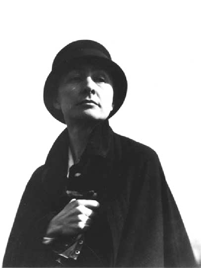
Alfred Stieglitz
The Bonesetter's Daughter excerpt
TRUTH
These are the things I know are true:
My name is LuLing Liu Young. The names of my husbands were
Pan Kai Jing and Edwin Young, both of them dead and our secrets
gone with them. My daughter is Ruth Luyi Young. She was born in a
Water Dragon Year and I in a Fire Dragon Year. So we are the same
but for opposite reasons.
I know all this, yet there is one name I cannot remember. It is
there in the oldest layer of my memory, and I cannot dig it out. A
hundred times I have gone over that morning when Precious Auntie
wrote it down. I was only six then, but very smart. I could count. I
could read. I had a memory for everything, and here is my memory
of that winter morning.
I was sleepy, still lying on the brick k'ang bed I shared with Precious
Auntie. The flue to our little room was furthest from the stove
in the common room, and the bricks beneath me had long turned
cold. I felt my shoulder being shaken. When I opened my eyes, Precious
Auntie began to write on a scrap of paper, then showed me
what she had written. "I can't see," I complained. "It's too dark."
She huffed, set the paper on the low cupboard, and motioned that
I should get up. She lighted the teapot brazier, and tied a scarf over her
nose and mouth when it started to smoke. She poured face-washing
water into the teapot's chamber, and when it was cooked, she started
our day. She scrubbed my face and ears. She parted my hair and
combed my bangs. She wet down any strands that stuck out like
spider legs. Then she gathered the long part of my hair into two
bundles and braided them. She banded the top with red ribbon, the
bottom with green. I wagged my head so that my braids swung like
the happy ears of palace dogs. And Precious Auntie sniffed the air
as if she, too, were a dog wondering, What's that good smell? That
sniff was how she said my nickname, Doggie. That was how she
talked.
She had no voice, just gasps and wheezes, the snorts of a ragged
wind. She told me things with grimaces and groans, dancing eyebrows
and darting eyes. She wrote about the world on my carry-around
chalkboard. She also made pictures with her blackened
hands. Hand-talk, face-talk, and chalk-talk were the languages I
grew up with, soundless and strong.
As she wound her hair tight against her skull, I played with her
box of treasures. I took out a pretty comb, ivory with a rooster
carved at each end. Precious Auntie was born a Rooster. "You wear
this," I demanded, holding it up. "Pretty." I was still young enough
to believe that beauty came from things, and I wanted Mother to favor
her more. But Precious Auntie shook her head. She pulled off
her scarf and pointed to her face and bunched her brows. What use
do I have for prettiness? she was saying.
Her bangs fell to her eyebrows like mine. The rest of her hair was
bound into a knot and stabbed together with a silver prong. She had
a sweet-peach forehead, wide-set eyes, full cheeks tapering to a small
plump nose. That was the top of her face. Then there was the
bottom.
She wiggled her blackened fingertips like hungry flames. See what
the fire did.
Amy Tan
Fern Hill
Now as I was young and easy under the apple boughs
About the lilting house and happy as the grass was green,
The night above the dingle starry,
Time let me hail and climb
Golden in the heydays of his eyes,
And honoured among wagons I was prince of the apple towns
And once below a time I lordly had the trees and leaves
Trail with daisies and barley
Down the rivers of the windfall light.
And as I was green and carefree, famous among the barns
About the happy yard and singing as the farm was home,
In the sun that is young once only,
Time let me play and be
Golden in the mercy of his means,
And green and golden I was huntsman and herdsman, the calves
Sang to my horn, the foxes on the hills barked clear and cold,
And the sabbath rang slowly
In the pebbles of the holy streams.
All the sun long it was running, it was lovely, the hay
Fields high as the house, the tunes from the chimneys, it was air
And playing, lovely and watery
And fire green as grass.
And nightly under the simple stars
As I rode to sleep the owls were bearing the farm away,
All the moon long I heard, blessed among stables, the nightjars
Flying with the ricks, and the horses
Flashing into the dark.
And then to awake, and the farm, like a wanderer white
With the dew, come back, the cock on his shoulder: it was all
Shining, it was Adam and maiden,
The sky gathered again
And the sun grew round that very day.
So it must have been after the birth of the simple light
In the first, spinning place, the spellbound horses walking warm
Out of the whinnying green stable
On to the fields of praise.
And honoured among foxes and pheasants by the gay house
Under the new made clouds and happy as the heart was long,
In the sun born over and over,
I ran my heedless ways,
My wishes raced through the house high hay
And nothing I cared, at my sky blue trades, that time allows
In all his tuneful turning so few and such morning songs
Before the children green and golden
Follow him out of grace.
Nothing I cared, in the lamb white days, that time would take me
Up to the swallow thronged loft by the shadow of my hand,
In the moon that is always rising,
Nor that riding to sleep
I should hear him fly with the high fields
And wake to the farm forever fled from the childless land.
Oh as I was young and easy in the mercy of his means,
Time held me green and dying
Though I sang in my chains like the sea.
Dylan Thomas

Joseph Turner
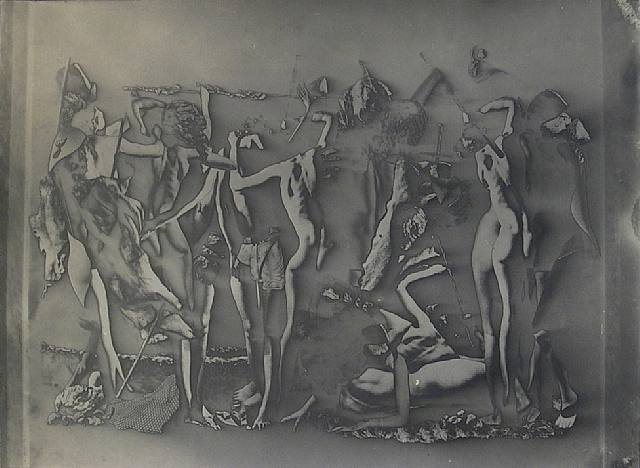
Raoul Ubac

Victor Vasarely

Versace
Mother Night excerpt
"Did you ever hear any of my broadcasts?" I asked him. The medium of my war crimes was radio broadcasting. I was a Nazi radio propagandist, a shrewd and loathsome anti-Semite.
"No," he said.
So I showed him a transcript of a broadcast, a transcript furnished to me by the Haifa Institute. "Read it," I said.
"I don't have to," He said. "Everybody was saying the same things over and over and over in those days."
"Read it anyway--as a favor," I said.
So he read it, his face becoming sourer and sourer. He handed it back to me. "You disappoint me," he said.
"Oh?" I said.
"It's so weak!" he said. "It has no body, no paprika, no zest! I though you were a master of racial invective!"
"I'm not?" I said.
"If any member of my S.S. platoon had spoken in such a friendly way about the Jews," said Arpad, "I would have had him shot for treason! Goebbels should have fired you and hired me as the radio scourge of the Jews. I would have raised blisters around the world!"
"You were already doing your part with your S.S. platoon," I said.
Arpad beamed, remembering his S.S. days. "What an Aryan I made!" he said.
"Nobody ever suspected you?" I said.
"How would they dare?" he said. "I was such a pure and terrifying Aryan that they even put me in a special detachment. Its mission was to find out how the Jews always knew what the S.S. was going to do next. There was a leak somewhere, and we were out to stop it." He looked bitter and affronted, remembering it, even though he had been that leak.
"Was the detachment successful in its mission?" I said.
"I'm happy to say," said Arpad, "that fourteen S.S. men were shot on our recommendations. Adolf Eichmann himself congratulated us."
"You met him, did you?" I said.
"Yes--" said Arpad, "and I'm sorry I didn't know at the time how important he was."
"Why?" I said.
"I would have killed him," said Arpad.
Kurt Vonnegut
Excerpted from Mother Night by Kurt Vonnegut Copyright © 1999 by Kurt Vonnegut.

Vera Wang
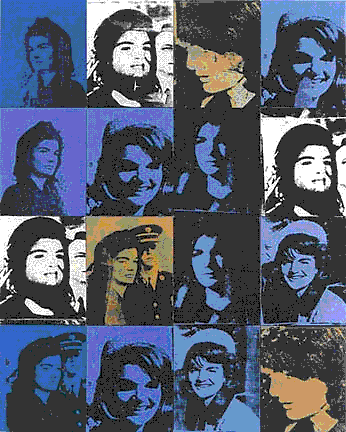
Andy Warhol
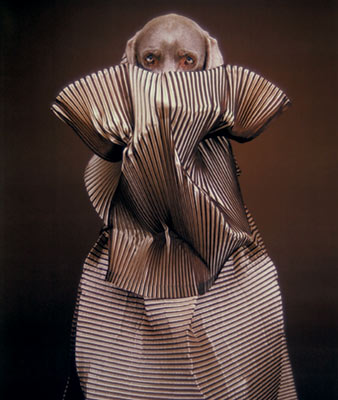
William Wegman
To the Lighthouse excerpt
"YES, OF COURSE, if it's fine tomorrow," said Mrs. Ramsay. "But you'll have to be up with the lark," she added.
To her son these words conveyed an extraordinary joy, as if it were settled, the expedition were bound to take place, and the wonder to which he had looked forward, for years and years it seemed, was, after a night's darkness and a day's sail, within touch. Since he belonged, even at the age of six, to that great clan which cannot keep this feeling separate from that, but must let future prospects, with their joys and sorrows, cloud what is actually at hand, since to such people even in earliest childhood any turn in the wheel of sensation has the power to crystallise and transfix the moment upon which its gloom or radiance rests, James Ramsay, sitting on the floor cutting out pictures from the illustrated catalogue of the Army and Navy Stores, endowed the picture of a refrigerator, as his mother spoke, with heavenly bliss. It was fringed with joy. The wheelbarrow, the lawnmower, the sound of poplar trees, leaves whitening before rain, rooks cawing, brooms knocking, dresses rustling- all these were so coloured and distinguished in his mind that he had already his private code, his secret language, though he appeared the image of stark and uncompromising severity, with his high forehead and his fierce blue eyes, impeccably candid and pure, frowning slightly at the sight of human frailty, so that his mother, watching him guide his scissors neatly round the refrigerator, imagined him all red and ermine on the Bench or directing a stern and momentous enterprise in some crisis of public affairs.
"But," said his father, stopping in front of the drawing-room window, "it won't be fine."
Had there been an axe handy, or a poker, any weapon that would have gashed a hole in his father's breast and killed him, there and then, James would have seized it. Such were the extremes of emotion that Mr. Ramsay excited in his children's breasts by his mere presence; standing, as now, lean as a knife, narrow as the blade of one, grinning sarcastically, not only with the pleasure of disillusioning his son and casting ridicule upon his wife, who was ten thousand times better in every way than he was (James thought), but also with some secret conceit at his own accuracy of judgment. What he said was true. It was always true. He was incapable of untruth; never tampered with a fact; never altered a disagreeable word to suit the pleasure or convenience of any mortal being, least of all of his own children, who, sprung from his loins, should be aware from childhood that life is difficult; facts uncompromising; and the passage to that fabled land where our brightest hopes are extinguished, our frail barks founder in darkness (here Mr. Ramsay would straighten his back and narrow his little blue eyes upon the horizon), one that needs, above all, courage, truth, and the power to endure.
Virginia Woolf
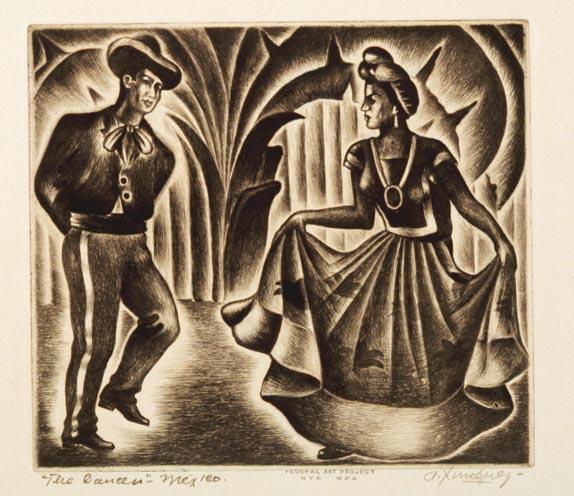
Alfredo Ximenez
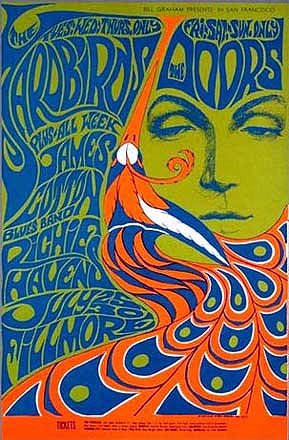
Yardbirds

Yuriko Yamaguchi
The
I WILL arise and go now, and go to Innisfree,
And a small cabin build there, of clay and wattles made:
Nine bean-rows will I have there, a hive for the honey-bee,
And live alone in the bee-loud glade.
And I shall have some peace there, for peace comes dropping slow,
Dropping from the veils of the mourning to where the cricket sings;
There midnight's all a glimmer, and noon a purple glow,
And evening full of the linnet's wings.
I will arise and go now, for always night and day
I hear lake water lapping with low sounds by the shore;
While I stand on the roadway, or on the pavements grey,
I hear it in the deep heart's core.
William

Piet Zwart
|
|
Melissa and I would like to |